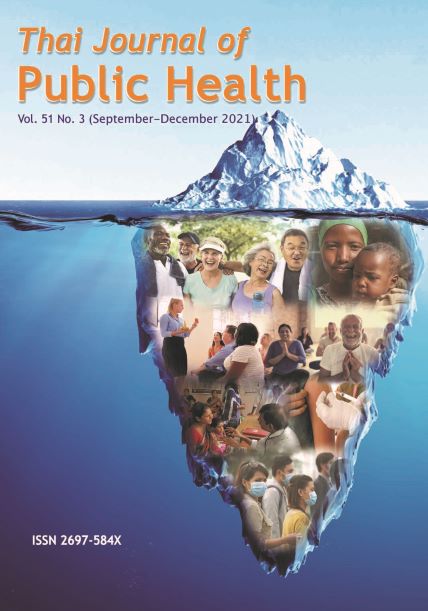Developing Community Potential in Managing Food Safety and a Herbal City for the Wellbeing of an Urban Community in Mahasarakham Province, Thailand
Keywords:
Food safety, herbal city, wellbeing, Mahasarakham urban community, Food safety and herbal knowledge, Action research, Urban communityAbstract
Food safety and herbal cities are public health ministry projects and correspond to a 20-year national strategic plan (2017-2036). Therefore, there is an idea to operate food safety in the public sector, integrating the herbal city project. This study aimed to expand community capacity in managing food safety and a herbal city for well-being in Mahasarakham urban community, Mahasarakham Province, Thailand.
This study used an action research approach, and was conducted from January 2018 to September 2020. The sample group for the food and herbal safety production base was 173 farmers. The target group for enhancing food safety and herbal knowledge was 280 stakeholders.
Results revealed that the 173 farmers modified their behavior and moved towards safe agricultural practices. From 200 Rais (320,000 m2) of participating agricultural land, 20.0% of the area was transformed and certified by Good Agriculture Practices (GAP), while 33.5% of the area was converted to organic farming. The average income from selling herbs was 1,252,150 Baht per year. Most of the target sample who were screened for choline esterase were classified within the safe level. Comparison between before and after the sample groups showed a significant increase in safety level from 39.9% to 52.0% (p=0.0001). The average knowledge score regarding food safety and herbal knowledge among the target sample increased significantly (p<0.001) after system development. After system development, the food safety and herbal knowledge of the sample group was classified as excellent. Quality monitoring which involved the surveillance of food contaminants around urban Mahasarakham community areas found all food contaminants decreased after expanding capacity of the community. In addition, this study promoted three smart schools (21.4%), three smart villages (21.4%), and a smart sub-district health-promoting hospital, and a primary care unit promoting health knowledge (100.0%).
Our findings suggest that promoting food safety and herbal knowledge programs or short educational courses could continuously improve networks in the community’s knowledge. The success factor in expanding community capacity in managing food safety and herbal city for wellbeing was named the PMH Model (P: Safe Production base; M: Money; H: Health knowledge regarding food safety and herbal production). This study showed successful results and reflected earnestness from all stakeholders who participated in the development of processes of food safety and herbal city in Mahasarakham urban community, Mahasarakham Province, Thailand.
References
Ministry of Public Health, Department of Health, Bureau of Food and Water Sanitation. Food and water sanitation practice manual for district public health. 2nd edition. Bangkok: The Agricultural Cooperative Federation of Thailand Limited; 2014. (In Thai)
Ministry of Public Health, Department of Disease Control. Annual epidemiological surveillance report 2018. Bangkok: Canna Graphic Limited Partnership; 2018. (In Thai)
Sanborn M, Cole D, Kerr K, Vakil C, Sanin LH, Bassil K. Systematic review of pesticide human health effects. Toronto: The Ontario College of Family Physicians; 2004.
National Research Council. Toxicity testing: Strategies to determine needs and priorities. Washington DC: National Academy Press; 1984.
National Cancer Institute. Hospital-based cancer registry 2019. Bangkok; New Thammada Press (Thailand); 2563. (In Thai)
Vogt R, Bennett D, Cassady D, Frost J, Ritz B, Hertz-Picciotto I. Cancer and non-cancer health effects from food contaminant exposures for children and adults in California: A risk assessment. Environ Health 2012; 11(83): 1-14.
Mahidol University, Faculty of Medicine Ramathibodi Hospital, Thailand. Risk of Colorectal Cancer. Available from https://www.rama.mahidol.ac.th/cancer_center/th/colorectal, accessed 27 May, 2021. (In Thai)
Office of the National Economic and Social Development Council, Thailand. National strategy. Available from http://www.ratchakitcha.soc.go.th/DATA/PDF/2562/A/046/T_0001.PDF, accessed 13 February, 2021. (In Thai)
Mahasarakham Hospital, Social Medicine Division, Health Consumer Protection Sub-Division. Report of surveillance of food contaminants in fiscal year 2017. n.p. 2017. (In Thai)
Zuber-Skerritt O. Action learning and action research: Paradigm, praxis and programs. In Sankara S, Dick B, Passfield R, eds. Effective change management through action research and action learning: Concepts, perspectives, processes and applications. Lismore, Australia: Southern Cross University Press; 2001. p 1-20.
Ministry of Public Health, Department of Disease Control, Thailand. Risk assessment for farmers from pesticides exposure. Available from http://envocc.ddc.moph.go.th /uploads/31858/1-56.pdf, accessed 16 February, 2021. (In Thai)
Grand JA, Ryan AM, Schmitt N, Hmurovic J. How far does stereotype threat reach? The potential detriment of face validity in cognitive ability testing. Human Performance 2010; 24(1): 1-28.
Strategy and Planning Division. The Sub-District Health Promoting Hospital Tid Dao’s guide for development. n.p. 2016. (In Thai)
Bloom BS. Handbook on formation and summative evaluation of student learning. New York: McGraw-Hill Book Company; 1971.
Wichai D, Kessomboon P, Sunvijid N. Risk behaviors and factors related to risk of pesticides use among farmers in Lampataw dam water shade, Chaiyaphum Province. Journal of the Office of DPC7 Khon Kaen 2018; 25(2): 22-34. (In Thai)
Phoopui S, Intrakamhaeng M. The food safety program for local community markets in Phon Sub-district, Khammuang District, Kalasin Province. Journal of Health Science Research. 2016; 10(2): 50-9. (In Thai)
Kanjanarach T. Health care of a community to manage medicine and health products. Khon Kaen: Khon Kaen University printing; 2017. (In Thai)
Downloads
Published
Issue
Section
License
Creative Commons License CC-BY-ND


